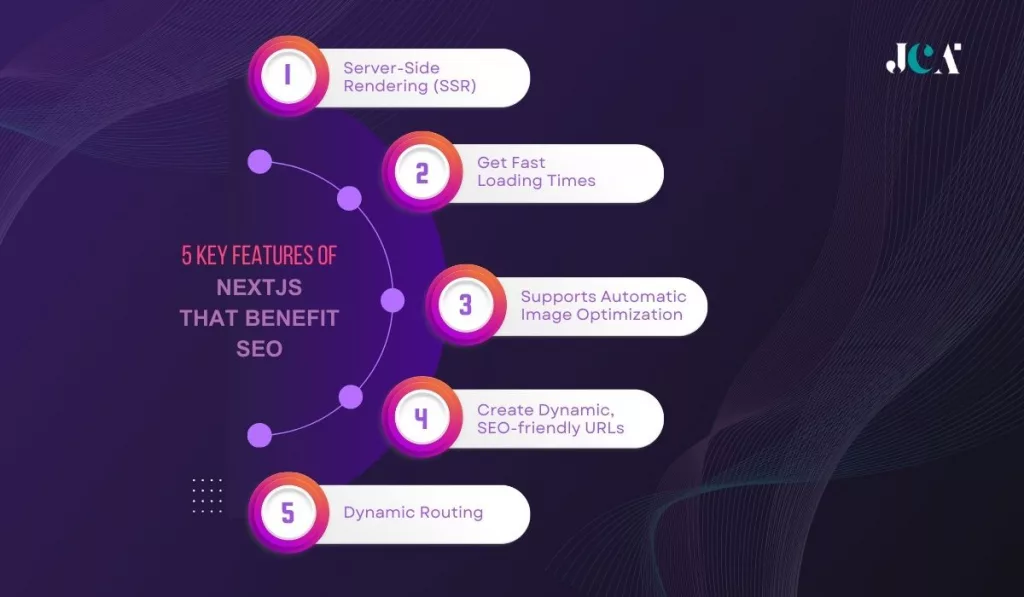Search Engine Optimization (SEO) is a cornerstone of a successful digital presence. In a world where a website’s visibility can make or break a business, leveraging the right technology to enhance SEO is crucial. This brings us to NextJS, a powerful tool in the modern web developer’s arsenal, particularly when it comes to boosting SEO.

As such, many businesses seek to partner with proficient NextJS app development companies in the USA, recognizing their expertise in harnessing this powerful tool to boost online visibility and drive digital success.
As you seek to understand the relationship between web development frameworks and SEO, NextJS stands out as a leading choice. Why is this the case? In this post, I will dive deep into the benefits of choosing NextJS for your SEO needs.
Understanding SEO and NextJS
SEO, or Search Engine Optimization, is the art and science of enhancing a website’s visibility on search engines like Google. It’s about making sure your site pops up when potential customers search for relevant topics. The quality of your SEO strategy can dramatically influence the traffic your site receives and, ultimately, the success of your online presence.
NextJS, on the other hand, is a React-based framework that offers a range of features designed to make web development more efficient and effective. It’s not just another tool in the developer’s kit; it’s a framework that directly addresses some of the common challenges in SEO, especially for sites built with JavaScript libraries like React.
The intersection of NextJS and SEO is where things get interesting. NextJS handles the common problems with JavaScript frameworks, such as slow load times and difficulties with search engine crawlers, elegantly. This framework offers solutions such as Server-Side Rendering (SSR) and static site generation, which are critical for enhancing a website’s SEO performance.
4 Key Features of NextJS that Benefit SEO
NextJS is equipped with several features that significantly enhance the SEO of a website. Understanding these features is crucial for developers and content creators aiming to improve their site’s visibility and performance in search engine results.

1. NextJS Offers Server-Side Rendering (SSR)
One of the most significant advantages of NextJS is its capability for Server-Side Rendering. This means that the content of a webpage is rendered on the server before it reaches the user’s browser. For search engines, this is a game-changer. It allows web crawlers to index the content more effectively since they’re presented with a fully rendered page, rather than having to execute JavaScript to view the content. This feature greatly improves the likelihood of a NextJS-powered website ranking higher in search results.
2. Get Fast Loading Times
NextJS is designed for performance. Websites built with this framework load faster, which is a critical factor for both user experience and SEO. Search engines favor sites that load quickly, and with NextJS, developers can ensure that their site meets this crucial criterion.
3. Supports Automatic Image Optimization
Images can often slow down a website, impacting SEO negatively. NextJS addresses this with automatic image optimization. This feature ensures that images are only as large as they need to be and are loaded efficiently, contributing to faster page speeds and better user experience.
4. You Can Create Dynamic, SEO-friendly URLs
NextJS makes it easy to create custom, SEO-friendly URLs for your content. Having clean, descriptive URLs is an essential part of SEO as it helps search engines understand the structure and content of your site more effectively.
5. Dynamic Routing
Next.js provides a file-based routing system that allows for the creation of complex routing patterns with ease. This is beneficial for SEO as it ensures that URLs are clean and readable, which is preferred by search engines. It also supports dynamic route parameters, making it easier to create SEO-friendly URLs for various content types.
Each of these features contributes to making NextJS an excellent choice for building SEO-friendly websites.
Also have a look at: Angular vs React: Which one is right for Web Development?
Comparing NextJS with Other Frameworks for SEO
When considering SEO, it’s essential to understand how NextJS stands out compared to other popular web development frameworks. While frameworks like React and Angular have their strengths, there are specific areas where NextJS particularly excels in terms of SEO.
1. Server-Side Rendering vs. Client-Side Rendering
Traditional React and Angular applications rely heavily on client-side rendering, which can be less efficient for SEO. Client-side rendering means that the content of the page is generated in the user’s browser, often leading to slower load times and difficulty for search engine crawlers to index the site content. NextJS, with its server-side rendering, overcomes these hurdles by sending fully rendered pages to the browser, making it more search-engine friendly.
2. Comparing on the Top of Performance Optimization
NextJS has a built-in advantage when it comes to performance. Faster website performance not only improves user experience but also boosts SEO rankings, as search engines favor quick-loading sites.
3. Image Optimization in NextJS vs Other Frameworks
NextJS automatically optimizes images, a feature not inherently available in other frameworks. Manually optimizing images in React or Angular can be time-consuming and often requires third-party libraries. NextJS simplifies this process, contributing to better page loading times and, consequently, better SEO.
4. Built-in SEO Features in NextJS vs Libraries
NextJS comes with several built-in features that are specifically tailored for SEO, such as the ability to set meta tags and create dynamic, SEO-friendly URLs with ease. These features may require additional libraries or custom development in other frameworks.
While React and Angular are powerful in their own right, NextJS offers specific advantages for SEO that can make a significant difference in a website’s search engine ranking.
Also have a look at: Trending Top 20 ReactJS Development Companies
Case Studies: Successful SEO Results with NextJS
Examining real-world examples provides valuable insights into how NextJS effectively enhances SEO. These case studies illustrate the tangible benefits that businesses have experienced by choosing NextJS for their web development needs.
- E-commerce Platform’s Improved Load Time and Rankings: An e-commerce website (Arcado), struggling with slow load times and poor search engine rankings, migrated to NextJS. The result was a dramatic improvement in page loading speed, thanks to NextJS’s efficient code-splitting and server-side rendering. This led to a significant boost in their search rankings and an increase in organic traffic, ultimately contributing to higher sales.
- Content-Heavy Site Gains Better Indexing: A news portal (Tiny News), initially built with a traditional JavaScript framework, faced challenges in getting its content indexed by search engines. After switching to NextJS, the site witnessed a substantial increase in the number of indexed pages. The server-side rendering feature of NextJS ensured that content was fully rendered when search engines crawled the site, leading to improved visibility and higher traffic.
- Tech Blog’s Enhanced User Engagement: A technology blog (Apps Insight), aiming to increase its readership, chose NextJS for its redevelopment. Post-migration, the site not only loaded faster but also provided a smoother user experience. This led to increased user engagement, lower bounce rates, and improved SEO rankings. The automatic image optimization feature of NextJS played a significant role in achieving these results.
These case studies demonstrate that by addressing critical SEO factors like load time, content indexing, and user experience, NextJS can significantly enhance a website’s search engine visibility and performance. The framework’s inherent features align well with SEO best practices, making it a preferred choice for businesses focused on improving their online presence.
Also read: How to Choose the Best Website Developer in India: Key Considerations
Best Practices for Implementing SEO with NextJS
Implementing SEO with NextJS involves more than just using the framework. It requires a strategic approach to fully leverage its features for optimal search engine visibility. Here are some best practices to consider when optimizing your NextJS website for SEO:
- Utilize Server-Side Rendering Effectively: Leverage NextJS’s server-side rendering for critical pages where SEO is a priority. This ensures that your content is readily indexable by search engines. For dynamic pages with less SEO significance, consider using client-side rendering or static generation as appropriate.
- Optimize Page Load Performance: While NextJS inherently improves performance, further optimizations can be made. Minimize the use of large libraries, optimize your assets, and utilize NextJS’s automatic image optimization. Monitor your site’s performance using tools like Google PageSpeed Insights to identify areas for improvement.
- Structure URLs and Meta Tags Wisely: Create clear, descriptive URLs for your pages, a feature easily managed in NextJS. Also, make use of NextJS’s ability to set meta tags dynamically. This includes optimizing title tags, descriptions, and Open Graph tags for social media sharing.
- Implement Robust Content Strategies: Quality content is key to SEO success. Use NextJS to serve rich, engaging content that is valuable to your audience. Regularly update your site with fresh content and ensure it’s relevant to your target keywords.
- Utilize NextJS’s Built-in SEO Features: Take full advantage of NextJS’s features like the built-in
<Head>component to manage meta tags effectively. Proper use of meta titles, descriptions, and structured data enhances your website’s SEO and improves click-through rates from search engine results pages. - Regularly Update and Maintain Your Site: SEO is not a one-time setup but an ongoing process. Keep your content fresh, monitor your site’s performance, and stay updated with the latest NextJS features and SEO trends. Regular maintenance ensures that your site remains competitive in search engine rankings.
By adhering to these best practices, you can ensure that your NextJS-powered website is not only technologically advanced but also fully optimized for search engines.
Also read: 10 Best Node.JS Software Development Companies in USA
Final Words
Throughout this article, we’ve explored the compelling reasons why NextJS is a wise choice for enhancing your website’s SEO. From its server-side rendering and fast loading times to its automatic image optimization and SEO-friendly URL capabilities, NextJS stands out as a powerful framework for building websites that rank well in search engines.
To recap, the three most important takeaways are:
- NextJS’s server-side rendering significantly improves search engine indexing and visibility.
- Given that search engines favor faster sites, the framework’s emphasis on performance optimization is essential for SEO.
- NextJS simplifies the implementation of technical SEO features, making it easier to create and maintain SEO-friendly websites.










Leave a Reply